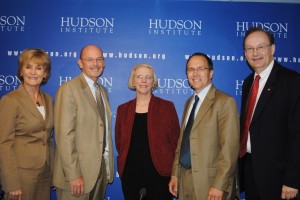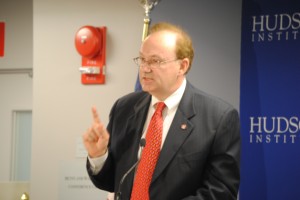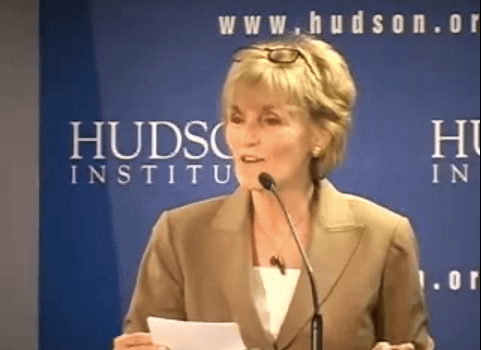Opportunity International Joins Other Thought Leaders in Global Development to Discuss the Future of Philanthropy
The following guest post was written by Emily Yahr, a media consultant for Opportunity International and attendee at Thursday’s Hudson Institute panel discussion.
 On Thursday, May 12, representatives from research institutions, think tanks, universities, NGOs, and federal agencies took some time out of their day to attend the “Global Philanthropy: Skating to Where the Puck Is Going to Be” event at the Hudson Institute in Washington, D.C. The purpose of the event was two-fold. First, it was to launch the 2011 Index of Global Philanthropy and Remittances, Hudson’s sixth annual summary of the magnitude and sources of private giving to the developing world. Second, it served as a forum for distinguished panelists to share their insights into how new forms of giving are transforming philanthropy and their predictions for the future of philanthropy in general.
On Thursday, May 12, representatives from research institutions, think tanks, universities, NGOs, and federal agencies took some time out of their day to attend the “Global Philanthropy: Skating to Where the Puck Is Going to Be” event at the Hudson Institute in Washington, D.C. The purpose of the event was two-fold. First, it was to launch the 2011 Index of Global Philanthropy and Remittances, Hudson’s sixth annual summary of the magnitude and sources of private giving to the developing world. Second, it served as a forum for distinguished panelists to share their insights into how new forms of giving are transforming philanthropy and their predictions for the future of philanthropy in general.
Panelists included:
- David Simms, Chair, Board of Directors, Opportunity International Network Services Organization
- Byron Johnson, Director, Baylor University Institute for Studies of Religion
- Susan Raymond, Executive Vice President, Changing our World, Inc.
- Dennis Whittle, President, The Whittle Group; and Co-founder, GlobalGiving
- Carol Adelman (moderator), Senior Fellow and Director, Hudson Institute’s Center for Global Prosperity
Each panelist offered their unique perspective on philanthropy with respect to their fields of work and individual passions for changing the world for the better through charitable action. Common threads ran through the discussion including the need for greater transparency and accountability, the role of technology in propelling philanthropic action, and the new generation of philanthropists who are increasingly focused on positive, sustainable outcomes.
Opportunity International‘s David Simms spoke about the important role that microfinance plays in the future and the sustainability of philanthropy, making a practical impact on poverty alleviation efforts. He told the group about his long-running affiliation with Opportunity, and how a trip to meet the people of Jamaica solidified his assertion that financial inclusion empowers individuals to build themselves up and out of poverty.
 David noted that Opportunity’s work has grown by leaps and bounds over the last decade. The Board Chair explained that the organization continues to grow and modify their work as they learn, just as they’ve done throughout their 40-year history. For instance, Opportunity offers secure, stable savings accounts to their clients because 98% of the people they seek to serve use informal savings (e.g., hiding cash in the home) and on average 22% of the money saved through informal means is lost every single year.
David noted that Opportunity’s work has grown by leaps and bounds over the last decade. The Board Chair explained that the organization continues to grow and modify their work as they learn, just as they’ve done throughout their 40-year history. For instance, Opportunity offers secure, stable savings accounts to their clients because 98% of the people they seek to serve use informal savings (e.g., hiding cash in the home) and on average 22% of the money saved through informal means is lost every single year.
Based on his work with Opportunity, David shared his predictions for the future of philanthropy saying, “I think philanthropy will continue to drive innovation. In the absence of philanthropy, Opportunity International would not have started banks; we would not have had the courage to do the things we’ve done over the last 40 years. Without philanthropy we couldn’t fund schools, protect farmers, etc. Philanthropy will drive increasing accountability, there is now a business model being applied to social outcomes. Philanthropy will drive a learning agenda because there is a willingness to collaborate across philanthropic and research organizations. I also believe that philanthropy will become increasingly personal. Through Opportunity International, a person can pick a loan they want to support and track the progress of the person they’ve funded.”
The event concluded with a Q&A session, which was a chance for individuals who work in philanthropy to learn more from the panel. Among the audience members there to hear from David Simms and his fellow panelists were Carrie Slease, Opportunity International Regional Director; Bruce Smith, member of Opportunity’s Board of Governors; and Emily Egan, co-chair of the DC chapter of Young Ambassadors for Opportunity.
Watch the full-length video of the Hudson Institute’s May 12 panel discussion: